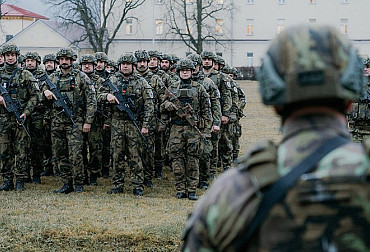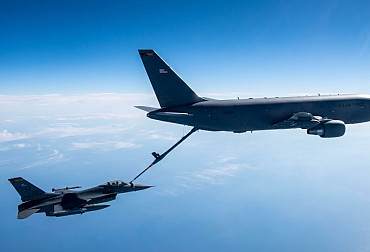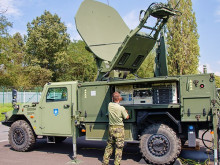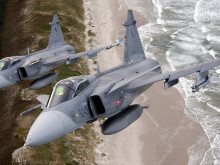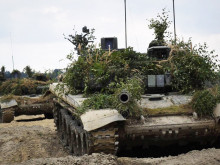The initiation of the European Commission proceedings will not affect the supply of helicopters for the Czech Air Force
The Ministry of Defence of the Czech Republic and the Czech Republic are dealing with the European Commission with regard to possible violations of the Directive on public procurement in the field of defence and the Treaty on the Functioning of the European Union. The letter of reproach cites the purchase of H-1 military helicopters for CZK 14.6 billion as problematic. A two-month deadline is now running to respond and address the shortcomings. The reality is that the takeover of the new H-1 helicopters, the AH-1Z Viper attack helicopters and the UH-1Y Venom multi-role helicopters, is well underway and should be completed by the end of this year. The H-1 simulation centre at the 22nd Air Force Base in Náměšt' nad Oslavou has also been built and is now operational, where pilots and ground personnel are being trained.

The intergovernmental agreement for the purchase of eight UH-1Y Venom multi-role aircraft and four AH-1Z Viper fighters was signed on 12 December 2019 by the then Ministers of Defence of the Czech Republic and the USA, Lubomír Metnar and Mark Esper. Minister Jana Černochová subsequently negotiated the delivery of two used Venom and six used Viper aircraft, which the Czech Republic received free of charge from the US, in Washington in April 2022.
A complicating moment in the whole process of acquiring new helicopters for the Czech Armed Forces is a complaint filed by the Italian helicopter manufacturer, Leonardo, which disliked the MoD's procedure for selecting the helicopters and demanded that the Office for the Protection of Competition (OPC) prohibit the Ministry from fulfilling the already signed contract with the US, because the MoD signed the contract with Bell while the time for settling objections and objections was still running. In the end, the Office did not grant the Italian objection and rejected the proposal to cancel the contract with the USA on the grounds that it threatened the existence of a broader defence or security programme of vital importance to the security interests of the state. However, the Office also fined the Ministry of Defence CZK 550 million for the premature conclusion of the contract.
In February this year, the European Commission initiated proceedings against the Czech Republic for alleged breach of the Defence Procurement Directive in connection with the purchase of US helicopters. According to its opinion, the Czech Republic was alleged to have circumvented the Defence Procurement Directive, specifically the possible abuse of the exemption for intergovernmental procurement. As the Commission literally stated, the direct award of the contract also violates the principles of non-discrimination, equal treatment and transparency because it denies EU companies the opportunity to bid and compete effectively for the contract. The Czech side now has a two-month deadline to respond to the European Commission's letter of reproach. The response will be drafted by the Foreign Ministry together with the Ministry of Defence. Subsequently, if the European Commission is not satisfied with the explanation provided, it may, as a last resort, bring an action before the Court of Justice of the European Union for a fine.
The current security situation and the urgent need for the Czech Army to modernise its equipment is a compelling argument for the implementation of rapid and effective acquisitions. In addition to ensuring the combat capability of the army, it is also about fulfilling our commitments to the Alliance. In order to reduce the threat of future additional costs associated with the payment of fines to unsuccessful bidders in tenders for the Czech Armed Forces, the law on the acquisition of military equipment and technology or further amendments to the law on public procurement could be a solution. The latest amendment to Act No. 134/2016 Coll. from June last year, instead of the fundamental changes that Defence Minister Jana Černochová warned about at the beginning of her tenure in the so-called Ten for Defence, only brought about the elimination of shortcomings in the transposition of EU procurement directives, which were pointed out by the European Commission. If we compare all the key defence documents of the Czech Republic, the KVAČR 2035 and the fact that the military acquisitions go beyond the scope of a single electoral term, the need to amend the legislation is very topical.
Lieutenant General Karel Řehka, Chief of the General Staff of the Czech Armed Forces, also drew attention to the need to increase the efficiency of the Army's acquisitions at the last Commanders' Assembly held on 20 February. At that time, he thanked for the adoption of the Law on Financing the Defence of the Czech Republic, which set defence spending at 2% of GDP, and at the same time pointed to the need to change the pace of modernisation of the army in the light of the current security situation and real threats. The times are dynamic, posing ever greater challenges. We need to modernise our forces, our processes, but also our thinking. Our acquisition system is unsustainable. Unsustainable for current and future needs. We must be able to respond quickly to technological developments and to our needs," General Řehka said in his speech.
We asked the press department of the Ministry of Defence several questions in connection with the European Commission's proceedings with the Czech Republic regarding the purchase of American helicopters:
Will the initiation of the European Commission's proceedings with the Czech Republic over the alleged violation of the defence procurement directive in any way affect the further supply of H-1 helicopters to the Czech Armed Forces?
The initiation of this procedure will not in itself affect the supply of helicopters.
Could this proceeding complicate the Czech Republic's or the Ministry of Defence's approach to government-to-government procurement in general?
The Ministry of Defence is convinced that currently all government-to-government purchases are fully compliant with both national and EU law. We therefore see no reason why a possible adverse EC decision should affect current procurement.
The Office for the Protection of Competition has previously imposed a half-billion-dollar fine on the Ministry of Defence for the tender for the army's H-1 helicopters. Could the European Commission's recent initiation of proceedings against the Czech Republic mean further fines or other sanctions?
According to EU rules, a sanction can indeed be imposed if the Czech Republic is found to be in breach of EU law.
How should future acquisitions proceed to avoid such proceedings?
We insist that the current acquisitions are being conducted in full compliance with both national and EU law and there is no reason to take special measures at this time in connection with the current EC proceedings. Should a legally binding decision be issued by the relevant EU authorities, we would of course examine the situation and, if necessary, incorporate its conclusions into the internal procedures applied to ongoing or upcoming contracts.











